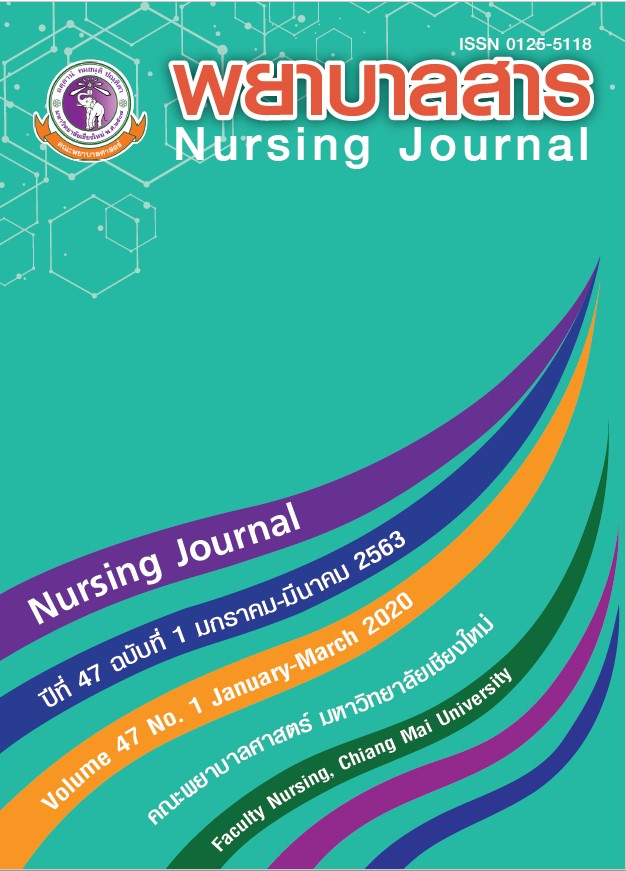Knowledge of Body Weight, Body Image and Gestational Weight Gain Among Pregnant Women.
Keywords:
Knowledge of Body Weight, Body Image, Gestational Weight Gain, Pregnant WomenAbstract
Gestational weight gain affects maternal health and fetal outcomes. The purpose of this descriptive correlational research was to examine whether there was a relationship between knowledge of body weight, body image, and gestational weight gain among pregnant women. The study sample consisted of one hundred and ninety-four participants, all of whom were pregnant women who had normal pre-pregnancy body mass index, and had gestational age of 36 weeks and selected by purposive sampling. The participants were taken from the antenatal clinics at Maharaj Nakhonsithammarat Hospital from September to November 2013. The research instruments used were Knowledge of Weight Gain Evaluation questionnaire, developed by Ritmontree, Xuto, & Sriarporn, based on the literature reviewed; and the Body Image Rating Scale, developed by Souto & Garcia (2002) which was translated and adapted into the Thai language by Sirirat Sarit-apirak (Sarit-apirak, 2008). Descriptive statistics and the Spearman rank order correlation coefficient were used to analyze the data.
Results of the study revealed that:
- The mean score of knowledge of body weight was 20.24 (S.D.= 4.83). There was 81.44% of participants having good knowledge of weight gain. The mean score of body image was 87.35 (S.D. = 12.88). There was 56.19% of participants having moderate perception of body image.
- The mean score of gestational weigh gain was 12.76 kilogram (S.D.=4.50) .
- There was a significant moderate negative correlation between Knowledge of weight gain and gestational weight gain among pregnant women (r = -.315, p < .01).
- 3. There was a significant low negative correlation between body image and gestational weight gain among pregnant women (r = -.143, p < .05).
These findings could be used to enhance knowledge of weight gain, body image, and gestational weight gain among pregnant women, and to advise pregnant women on appropriate weight gain.
References
Brown, A., & Avery, A. (2012). Healthy weight management during pregnancy: What advice and information is being provided. Journal of Human Nutrition and Dietetics, 25(4), 378-387. doi:10.1111/j.1365-277X.2012.01231.x
Chetchaowalit, T. (1998). Developmental psychology for nurses. Songkhla: Chanmuangkarnpim. (In Thai)
Copper, R. L., DuBard, M. B., Goldenberg, R. L., & Oweis, A. I. (1995). The relationship of maternal attitude towards weight gain to weight gain during pregnancy and low birth weight. Journal of Obstetrics and Gynecology, 85(4), 590-595.
Fraser, D. M., & Cooper, M. A. (2003). Myles textbook for midwives. London: Cherchill Livingston.
Groth, S. W., & Kearney, M. H. (2009). Diverse women's beliefs about weight gain in pregnancy. Journal of Midwifery & Women’s Health, 54(6), 452-457. doi:10.1016/j.jmwh.2009.03.003
Herring, S. J., Oken, E., Haines, J., Rich-Edwards, J. W., Rifas-Shiman, S. L., Kleinman, K. P., & Gillman, M. W. (2008). Misperceived pre-pregnancy body weight status predicts excessive gestational weight gain: Findings from a US cohort study. BMC Pregnancy and Childbirth, 8(1), 54. doi:10.1186/1471-2393-8-54
Hill, B., Skouteris, H., McCabe, M., Milgrom, J., Kent, B., Herring, S. J., . . . Gale, J. (2013). A conceptual model of psychosocial risk and protective factors for excessive gestational weight gain. Midwifery, 29(2), 110-114. doi:10.1016/j.midw.2011.12.001
Isaranurag, S. (2006). Low birth weight babies: Thai health problems that cannot be solved. Journal of Public Health and Development, 4(1): 67-79. (In Thai)
Lertbunnaphong, T. (2008). Maternal body weight and pregnancy: Factors that an obstetrician overlooks. Siriraj Medical Bulletin, 10(2): 81-90. (In Thai)
Margerison Zilko, C.E., Rehkopf, D., Abrams, B. (2010). Association of maternal gestational weight gain with short-and long-term maternal and child health outcome. American Journal of Obstetric Gynecology, 202(6): 574.e1-8.
Mehta, U. J., Siega-Riz, A. M., & Herring, A. H. (2011). Effect of body image on pregnancy weight gain. Maternal and Child Health Journal, 15(3), 324-332. doi: 10.1007/s10995-010-0578-7
Olander, E. K., Atkinson, L., Edmunds, J. K., & French, D. P. (2011). The views of pre-and post-natal women and health professionals regarding gestational weight gain: An exploratory study. Sexual & Reproductive Healthcare, 2(1), 43-48. doi:10.1016/j.srhc.2010.10.004
Polit, D. F. (2010). Statistics and data analysis for nursing research (2nd ed.). New Jersey: Pearson Education.
Price, B. (1990). Body image: Nursing concepts and care. London: Prentice Hall International.
Rasmussen, K. M., & Yaktine, A. L. (Eds.). (2009). Weight gain during pregnancy: Reexamining the guidelines. Washington, DC: Institute of Medicine & The National Academies Press.
Ricci, E., Parazzini, F., Chiaffarino, F., Cipriani, S., & Polverino, G. (2010). Pre-pregnancy body mass index, maternal weight gain during pregnancy and risk of small-for-gestational age birth: Results from a case-control study in Italy. Journal of Maternal-Fetal and Neonatal Medicine, 23(6), 501-505. doi:10.3109/14767050903216025
Sarit-apirak, S. (2008). Relationship between personal factors, relationship between spouses, self-esteem, and the perception of the image of pregnant women. Bangkok: Mahidol University. (In Thai)
Schieve, L. A., Cogswell, M. E., Scanlon, K. S., Perry, G., Ferre, C., Blackmore-Prince, C., . . . Rosenberg, D. (2000). Pre-pregnancy body mass index and pregnancy weight gain: Associations with preterm delivery. Obstetrics & Gynecology, 96(2), 194-200.
Souto, C. M., & Garcia, T. R. (2002). Construction and validation of a body image rating scale: A preliminary study. International Journal of Nursing Terminlogies and Classifecations, 13(4), 117-126. doi:10.1111/j.1744-618X.2002.tb00415
Stables, D., & Rankin, J. (Eds.). (2005). Physiology in childbearing with anatomy and related biosciences. Philadelphia: Health Sciences Rights Department in Philadelphia.
Sui, Z., Turnbull, D., & Dodd, J. (2013). Effect of body image on gestational weight gain in overweight and obese women. Women and Birth, 26(4), 267-272. doi:10.1016/j.wombi.2013.07.001
Tiansawad, S. (2007). Content validity index: critique and recommendation for computation. Nursing Journal, 34(3): 1-7. (In Thai)
Titapant, V., Lertbunnaphog, T., & Pimsen, S. (2013). Is the U.S. Institute of Medicine recommendation for gestational weight gain suitable for Thai singleton pregnant Women. Journal Medical Association Thai, 96(1), 1-6.
Downloads
Published
How to Cite
Issue
Section
License
บทความที่ได้รับการตีพิมพ์เป็นลิขสิทธิ์ของวารสารพยาบาลสาร
ข้อความที่ปรากฏในบทความแต่ละเรื่องในวารสารวิชาการเล่มนี้เป็นความคิดเห็นส่วนตัวของผู้เขียนแต่ละท่านไม่เกี่ยวข้องกับมหาวิทยาลัยเชียงใหม่ และคณาจารย์ท่านอื่นๆในมหาวิทยาลัยฯ แต่อย่างใด ความรับผิดชอบองค์ประกอบทั้งหมดของบทความแต่ละเรื่องเป็นของผู้เขียนแต่ละท่าน หากมีความผิดพลาดใด ๆ ผู้เขียนแต่ละท่านจะรับผิดชอบบทความของตนเองแต่ผู้เดียว






